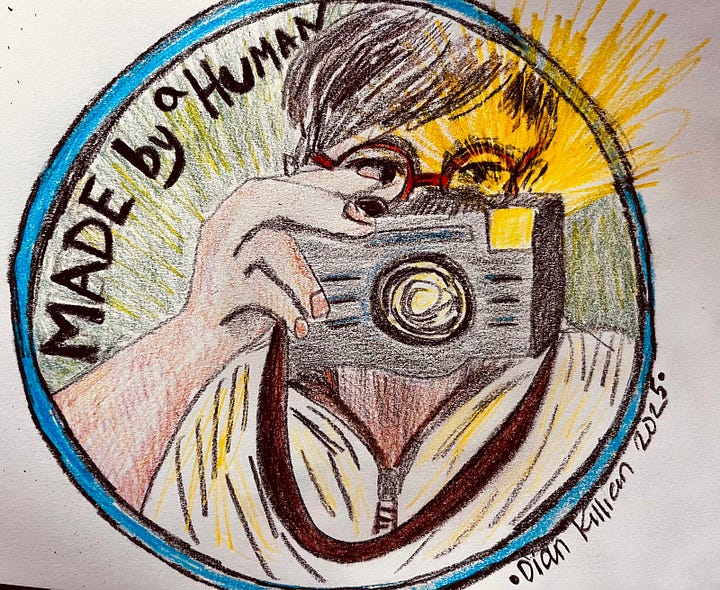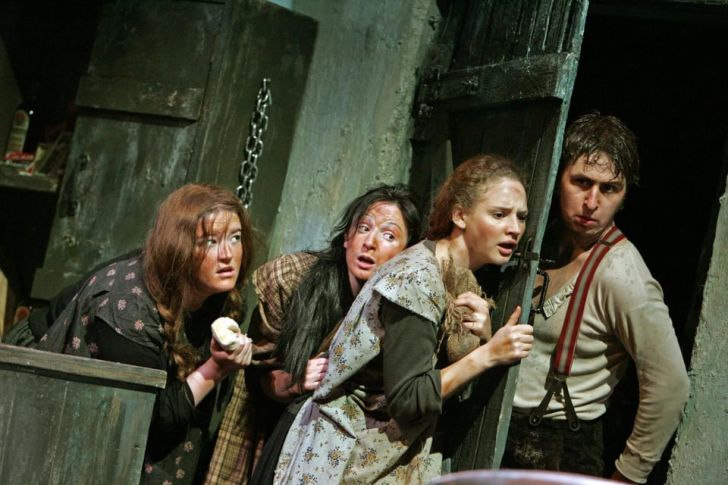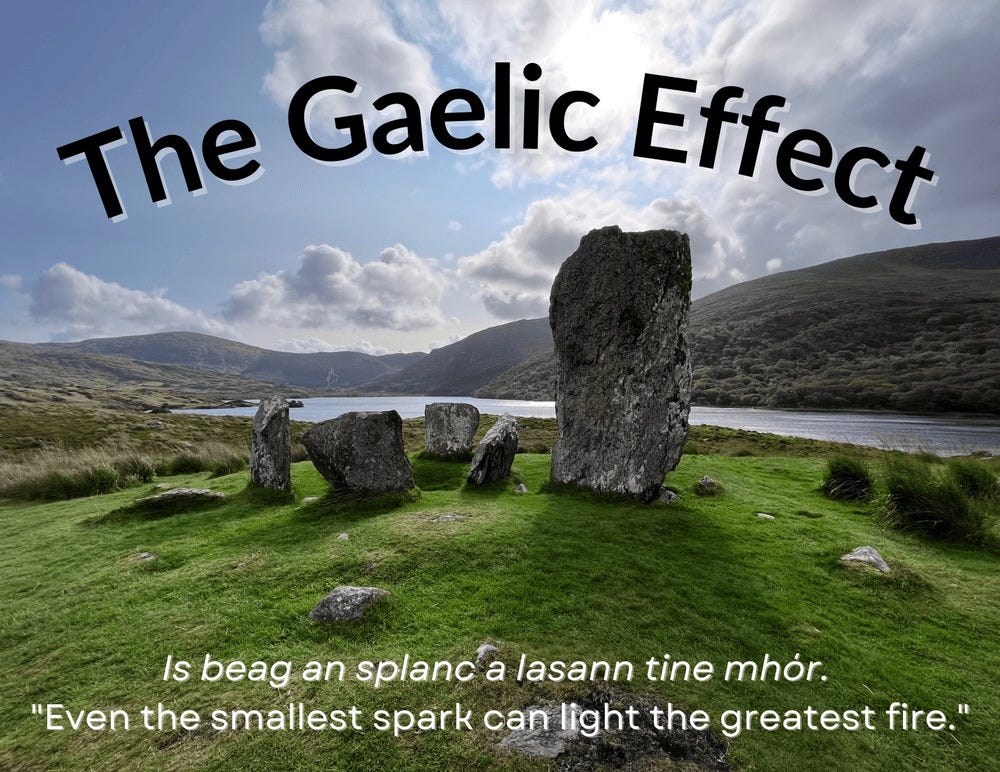This is the monthly cultural feast of The Gaelic Effect, featuring poetry, music, art and/or video. As a support for Irish learners, focail as Gaeilge (words in Irish) are hyperlinked to their pronunciation.
“To be talking to you is like arguing with a sack full of fleas.” —The Playboy of the Western World
I still remember what Terence Brown, one of my lecturers at Trinity College, Dublin, told us about Synge: that the playwright stayed with Irish and Hibernian-English speakers, listening through the floor boards, taking detailed notes on what he heard. These notes became the basis for The Playboy of the Western World and other plays. Synge acknowledges this eavesdropping in The Playboy’s introduction:
“In writing THE PLAYBOY OF THE WESTERN WORLD, as in my other plays, I have used one or two words only that I have not heard among the country people of Ireland, […] A certain number of the phrases I employ I have heard also from herds and fishermen along the coast from Kerry to Mayo, or from beggar-women and ballad-singers nearer Dublin; and I am glad to acknowledge how much I owe to the folk imagination of these fine people. […] When I was writing The Shadow of the Glen, some years ago, I got more aid than any learning could have given me from a chink in the floor of the old Wicklow house where I was staying, that let me hear what was being said by the servant girls in the kitchen. This matter, I think, is of importance, for in countries where the imagination of the people, and the language they use, is rich and living, it is possible for a writer to be rich and copious in his words, and at the same time to give the reality, which is the root of all poetry, in a comprehensive and natural form.” —The Playboy of the Western World
Synge was a fluent Irish speaker. He spent five summers in the Aran Islands immersing himself in the language; while not an exceptional student overall, he won the Irish prize at Trinity College, Dublin (Irish Stew). Not surprisingly, when reading Synge’s work you can hear the sounds of Gaeilge ringing through. There is a lyrical, sing-song quality that reminds me of the Munster dialect (in Cork and Kerry) yet echos the Irish language as a whole. You can watch some (or all if you like) of The Playboy of the Western World here, performed by the Druid Theatre company:
Words are but the shadows of our deeds.—The Playboy of the Western World
Listening to the play, you can hear the cadence of Irish. You can also hear the Irish story telling tradition. Synge based the play on a real story reputedly told to him by an old man from the Aran Islands. While based in a fictional shebeen (an unlicensed pub) in County Mayo, the character of Christy Mahon, the "savage hero" of the play, was, in real life, a convicted criminal who assaulted a woman on Achill Island in the late 19th century. Convicted, he escaped to America where he became a folk-hero, “falsely claiming his actions had been political and carried out on behalf of the Irish Republican Brotherhood.” (Wiki) Similar to the play, in America some thought the woman (an English landlord) had died; in fact, she survived, “albeit disfigured and forced to wear a veil when out in public.” (Wiki) All of this loosely parallels the play. On one level, the play is about storytelling itself: Christy Mahon becomes the talk of the town because of the tale he tells (that he’s murdered his own father). This would normally be scandalous (in fact, when the play opened at the Abbey Theatre in Dublin there were riots, since many found it offensive); yet it’s because Christy did this bold deed that he’s seen as daring and heroic. Yet as the play shows us (when Christy’s dad turns up—still with the living), there’s often a gap between tall tales and reality:
“I'll say, a strange man is a marvel, with his mighty talk; but what's a squabble in your back yard, and the blow of a loy, have taught me that there's a great gap between a gallous story and a dirty deed.”
Synge’s work draws on a language and an oral tradition of story telling that’s thousands of years old. In the video below, a storyteller from County Mayo—a native Irish speaker with no Béarla (English) and unable to read or write, can recite hundreds of stories from memory. He is compared here to Homer, who is now also believed to have worked in the oral tradition. When this video was made, the last surviving person in this Mayo community who could recite epics in Irish had died just 40 years before. The style of speech, especially the formulas or “runs” where highly formalized phrases are repeated, parallel practices found in the Iliad. The folklorist from University College, Dublin, had been collecting stories from the storyteller for ten summers and the storyteller still had more tales to tell. The reason he learned so many is that he was “greedy for stories.”
“Love is like a flame that sets fire to the heart.”—The Playboy of The Western World
Here is the story he tells:
“No sooner did the day dawn than Mártan, the fair warrior, rose too. He washed himself, put on his armor and crown of gold, and took up his star of knowledge and sword of light. He went down to the stable with his father, the king, and took the best steed. They went off with such speed that they were overtaking the wind ahead of them while the wind behind couldn’t catch up ‘till nightfall and the day’s end. […] He had a ring in memory of his old love, for the fair faced women of Ireland. ‘What do you want?’ said the ring. ‘I need a stout boat, well fitted,’ replied Mártan, ‘to take me to that island.’ No sooner did he utter the words than there was a boat waiting at the jetty.”
Now look at some passages from The Playboy of the Western World:
“Isn't there the light of seven heavens in your heart alone, the way you'll be an angel's lamp to me from this out, and I abroad in the darkness, spearing salmons in the Owen, or the Carrowmore?”
and:
“May I meet him with one tooth and it aching, and one eye to be seeing seven and seventy devils in the twists of the road, and one old timber leg on him to limp into the scalding grave.”
In Synge’s Hibernian-English, you can hear the cadence of the Irish language. More, in both his words and the storyteller’s, there are aspects of the Irish language that have been highlighted in different editions of The Gaelic Effect: how Irish (and by extension, Synge’s Hibernian English) is grounded in the natural world (see The Sun Stands Still: Grounding in the Natural World). This brings in a quality of “showing v.s. telling.” As the folklorist points out, in English you’d just say, “they set sail and got there—but in Irish, it’s much more complicated than that,” and, I would add, more beautiful. Rather than “We’ll spend the rest of our lives together, happy, working and in love,” here endearment is grounded in the senses, body, and natural world: “the light of seven heavens in your heart alone, the way you'll be an angel's lamp to me from this out.” We also see here aspects found in Irish curses (see Close to the Bone) where for emphasis it’s not one devil going after you or climbing your spine but nine; likewise, here there are “seven heavens” and “seven and twenty” devils. Affection is expressed not in “I love you” (see The Body Sings Electric) but attempting to describe what’s in your heart: the pulse of my heart; the bright shining light of my heart; your heart in my heart. We also see in the story teller’s tale the liminality of indigenous Irish culture, where all things are alive (see A World Pulsing with Life) and so magic can happen—where a ring asks a question and a boat appears.
On a meta level, The Playboy of the Western World is not just about what it means to be a hero and the power of story-telling. It ultimately explores aspects of the social contract—through the violation of it—and also (ironically in this case) how much togetherness, community and relationality matter in Irish culture (see What’s Love Got to Do with It—Being Le Chéile). As Molly (of Irish with Molly) pointed out in our recent conversation (see Episode 28 of her podcast), this “togetherness” can have an imbalanced aspect in Irish culture when interdependence tips over into co-dependence. The whole reason Christy Mahon becomes a hero for supposedly murdering his own father is because he defies these expectations and so is seen as courageous and daring; yet he is cast out by the same community that adores him (again showing the importance of community, via its rejection) when it turns out that his “heroic” deed failed.
I hope you’ve enjoyed this exploration of Irish storytelling and Hibernian-English, as seen through the work of Synge. Let me know what you think.
Sending you the light of seven heavens,
Dian, i mBaile Atha Cliath (in Dublin)
You can also support The Gaelic Effect and its mission by making a one-time donation by clicking anseo (here).






Céad míle buíochas from an Irish-Canadian storyteller, from across the sea. I really appreciate your writing and the links you've included. They're inviting me even deeper into the relationship with the tradition of Irish storytelling and reiterating something I know in my bones: that stories and language are of the land.
Watching that video brought a tear to my eye. I try not to focus on the degradation of culture too much, prevent solutions and ways to reclaim what we've lost, but listening to that storyteller really made me feel the loss.